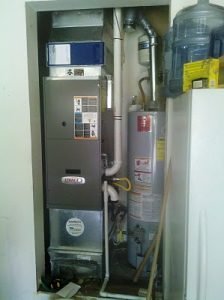
Which Heating System Is Right For Seattle’s Climate
Heating systems often vary by region, and which one you choose depends on where you live in Washington. Seattle’s climate is more or less balanced, thanks in no small part to the moderation by the Pacific Ocean, Puget Sound, and Lake Washington.
With extreme temperatures being a rarity in the area, having suitable Seattle heating systems can make all the difference in cost, comfort, and efficiency. However, from November to April the average monthly low temperature ranges from 36-42 degrees. So, the right heating system for the climate is essential.
There is no one solution that is right for every home and family. Even the same house can have different optimal heating systems, given different family needs and budgets. When you need to warm your house, here are the best systems that will suit the greater Seattle location well. You will need to consider many factors, in addition to climate, to determine the best heating system for your home and family.
Natural Gas Furnace
 The most common type is natural gas furnaces that are very energy efficient. Natural gas supplies have significantly increased over the past ten years, which has driven prices down, so the cost to heat your home is usually significantly lower than oil or propane fuel. A furnace generally costs more to install than other alternatives, but it comes with the advantage of generating heat at higher temperatures and is usually faster than an ordinary heat pump. This is done through the process of combustion, and as effective as it is, it does come with one major disadvantage: exhaust gases.
The most common type is natural gas furnaces that are very energy efficient. Natural gas supplies have significantly increased over the past ten years, which has driven prices down, so the cost to heat your home is usually significantly lower than oil or propane fuel. A furnace generally costs more to install than other alternatives, but it comes with the advantage of generating heat at higher temperatures and is usually faster than an ordinary heat pump. This is done through the process of combustion, and as effective as it is, it does come with one major disadvantage: exhaust gases.
In the event that something goes wrong or fails within a gas furnace, there is a possibility that the heating system may release exhaust gases such as carbon monoxide. It’s the odorless byproduct of the combustion process, which is usually expelled correctly. But if it doesn’t, it could pose a severe health hazard to your family. This is why it becomes imperative to have the system maintained regularly and set up a carbon monoxide alarm that detects unwanted gas.
Furnace Heat Uniformity & Efficiency
If you are leaning towards this heating system option, consider the benefits of a modulating furnace. This type of furnace provides more consistent heat throughout your house, eliminating spots that are too hot or cold. The furnace makes frequent minor adjustments to keep at temperature. This reduces the fluctuations caused by a traditional furnace that shuts off once it reaches your preset thermostat temperature.
Furnaces also come in different levels of efficiency, just like Air Conditioner units. Instead of SEER, which is a measure of A/C energy efficiency, it is AFUE (annual fuel utilization efficiency) that measures Furnace efficiency. You can get furnaces with an AFUE rating of 80%, 90%, 95%, and up to 98%. This is a measure of the amount of fuel you supply to the furnace compared to the amount of heat that is produced. If you buy a furnace that is 80% AFUE it means 20% of the fuel is wasted. You could reduce your monthly heating bill by around 15% by choosing a furnace that is 95% AFUE.
Ducted Heat Pumps Are Great For Heating Systems
Heat pumps extract heat from the surrounding air and ground and transfer it into your home. It also works like an Air Conditioner unit as it uses a refrigerant to cool your home when it is hot. A typical heat pump connects to your ducted system and can work with or without a furnace as a backup. It runs on electricity instead of natural gas, propane, or heating oil like a furnace. However, a heat pump is more energy-efficient than a traditional electric furnace, typically by 30-40%.
Using a heat pump as the sole heating system works best when the temperature rarely dips below 40° outside. If the temperature is commonly colder, as it is here in the greater Seattle area for four months each year, you may need a backup heat source. Consider a backup heating source, a heat pump paired with a furnace or an electric air handler to ensure you can heat to a comfortable temperature on really cold days. The combined system can be more energy efficient than other electric heat options.
Ductless Heat Pumps
A ductless heat pump is a relative newcomer to the HVAC industry. According to Energy Star, ducts can result in a 15-20% loss of heating and cooling efficiency due to leaks, holes, and poorly connected ducts. A ductless heat pump eliminates energy-wasting ducts, which can provide a more efficient system.
A ductless heat pump also heats and cools your home similarly to an air source heat pump but without ducts. A ductless heat pump system consists of one outside compressor/condenser unit and indoor units mounted on the ceiling or walls of each room or area that you wish to heat and cool. Free-standing floor units are also available. The outside condenser unit is connected to the inside air-handling units by conduits that contain power cables, refrigerant tubing, suction tubing, and a condensate drain. The indoor units essentially replace the ductwork.
Because of the control of specific rooms, it allows, this heating system makes it possible for the user to use lesser amounts of electricity than its counterparts and makes it a cost-effective approach to providing warm or cool air. The low operating costs, coupled with relatively easy installation and flexibility of positioning, make this particular system a popular choice for many people.
Select The Right Size Heating System
If you select the same type of system for a replacement, then don’t assume that your new heating system option should be sized the same as your current one. Your current heating system might not have been appropriately sized when initially installed, or there may have been energy efficiency improvements made to your home over the years. A good Seattle HVAC contractor will conduct a survey of your home and base its proposal on your home’s heat load calculation.
Heating System Factor To Consider
Here are some factors to consider when selecting the optimal Seattle heating systems.
- Installation Cost. A furnace is typically more expensive to install than a ductless heat pump. This is especially true if your house does not already have ducts that are required for a furnace.
- Operating Cost. Washington Gas Company shows the average annual cost of an average efficiency natural gas furnace vs an average efficient heat pump costs $574 vs $838, respectively.
- Energy Efficiency. A heat pump is typically more energy-efficient than a furnace. This is especially true for a ductless heat pump that does not lose heat due to the ducts required for a furnace (or a heat pump connected to your ducts). However, due to the low cost of natural gas in the Seattle area, your annual operating cost will be lower with a furnace.
- Maintenance cost. A furnace is cheaper to maintain than a heat pump. A furnace has fewer parts and operates for fewer months out of the year. So, there is less that can go wrong and less wear on a furnace.
- Rebates. Check with your electric or gas company for rebates provided for selected energy-efficient heating systems. For example, Puget Sound Energy offers rebates that range from $350-$800.
- Safety. A heat pump does NOT have exhaust gas that includes carbon monoxide and can pose a health danger.
- Air Quality. A heat pump provides better air quality inside your house. A furnace creates exhaust gas as a by-product that makes for dirtier air, and the ductwork collects dust.
- Noise. A heat pump is quieter than a furnace.
- Space. A furnace and the associated ductwork that connect to vents take less space inside your house. A ductless heat pump has indoor units that are mounted on walls, ceiling, or free-standing on the floor.
- Longevity. A furnace will last longer than a heat pump. It has fewer parts and is used less per year than a heat pump that operates to both heat and cool your home.
- Effectiveness. A furnace works better in periods when it is colder than 40 degrees. A heat pump may need a backup heating source to meet your needs when the weather is really cold.
Selecting The Right Heating System For This Region
There are many different kinds of Seattle heating systems that can work for you. They’re efficient, effective, and suit the climate well. As was stated earlier, however, it is always wise to get your home or business office assessed by an experienced HVAC contractor. They can help you weigh the factors to determine what heating system solution is best for your home and family needs.
Contact Fischer Heating for any additional questions you may have about Seattle heating systems, or give us a call today at 206-202-9499.
